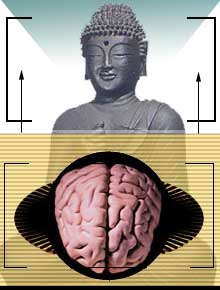Uplifting thoughts
By Stephen Pincock, Financial Times, January 14 2005
London, UK -- Looking out on a depressingly dark and damp January afternoon recently, my mind turned, naturally, to the search for happiness. We all put a lot of effort into acquiring the climate, clothes and real estate we think will bring happiness, but science is increasingly supporting the old idea that real happiness relies less on scoring a great beachfront apartment than on what?s going on inside your head.
 One particularly interesting line of research has emerged from an unlikely collaboration between some eminent US scientists and the Dalai Lama. Their work suggests that happiness is a skill that can be learned.
One particularly interesting line of research has emerged from an unlikely collaboration between some eminent US scientists and the Dalai Lama. Their work suggests that happiness is a skill that can be learned.
Every year or two since 1987, the exiled Tibetan leader has been meeting with small groups of leading researchers for week-long gatherings under the aegis of the Mind and Life Institute - an organisation that fosters links between science and Buddhism. As a result of those meetings, researchers such as neuroscientist Richard Davidson at the University of Wisconsin-Madison, have been conducting experiments on experienced meditators - with fascinating results.
Late last year, Matthieu Ricard, a Buddhist monk involved with the Mind and Life Institute, described some of the latest findings in a talk he gave at London?s French Institute. Ricard, who gained a PhD in biochemistry before focusing on Buddhist studies, explained that from a Buddhist perspective the contemplative or meditative tradition is a kind of science of the mind.
A Buddhist approach to dissipating negative emotions like jealousy, anger and obsession is to train the mind to focus on the phenomenon of the emotion rather than the cause - or to apply antidotes such as altruism. For Buddhists, Ricard explained, true happiness is inextricably bound up with altruism. ?We quickly find, if we look at the inner conditions that make happiness flourish, that genuine altruism, loving kindness, empathy and openness are crucial factors.?
Experiments conducted by Davidson?s team support this idea. For example, in an experiment whose results appeared in part in November in the Proceedings of the National Academy of Sciences, the researchers studied the neurological states of eight experienced meditators, each of whom had completed between 10,000 and 50,000 hours of meditation.
The meditators - six Buddhist monks and two lay people - were compared with 10 students who had undergone a week of meditative training for 45 minutes a day. Each participant was assessed using functional magnetic resonance imaging (MRI) scans and electroencephalogram (EEG) analysis. Davidson had already shown that functional MRI images can make distinctions in brain activity with different emotional states. When people are anxious, angry or depressed the most active brain areas are in the amygdala and the right prefrontal cortex. When people are enthusiastic and energised there is heightened activity in the left prefrontal cortex.
In the latest study, the subjects were studied when their brains were in a neutral state and while meditating on generating a state of ?unconditional loving-kindness and compassion?. There were only minor changes in brain activity between the two states for the students, but huge changes in the meditators, Ricard said. The scale of the change correlated with the number of hours of meditation they had put in. ?What we see when the meditators generate a strong feeling of compassion is that there?s a very strong increase in the gamma frequency in the left side of the prefrontal cortex, and the right side is decreased,? he said. So compassion correlated with the positive left side.
These studies, and others that are ongoing, are impressive, but the goal wasn?t to show that Buddhists are the Olympic champions of the mind, Ricard says. ?The main point is to rehabilitate the notion of ?mind training?. We consider that attention, altruism and compassion, emotional balance and happiness are skills that can be trained. Meditation is not a mere relaxation method but an in-depth, long-term cultivation of human qualities.?
Ricard found it fascinating to return to science after 35 years of absence, and to do so with such exceptional scientists, he told me by e-mail from the monastery in Nepal where he lives. ?I was extremely interested to see if the latest methods of scientific investigation would first reveal noticeable changes in the brain during meditation, and then if clearly different meditative states such as focused attention, altruistic love and compassion and ?open presence? would give clearly distinct brain signatures.?
The research is gathering interest. For example, Ricard has just spent 10 days in the US talking to eminent neuroscientists at Harvard and Princeton. Back at Madison, the work by Davidson and his colleague Antoine Lutz is now maturing as a major stream of research. Lutz has got a grant from the US National Institutes of Health to study the long-term effects of meditation, a first for NIH, Ricard said.
?I have been also struck by the rich, exciting and warm atmosphere in which this collaboration with the scientists is taking place. This is most rewarding, both on the scientific and human levels, and I can?t help but think that we are really on the threshold of groundbreaking research.?
All of which was more than enough cheer to brighten a gloomy day.

 One particularly interesting line of research has emerged from an unlikely collaboration between some eminent US scientists and the Dalai Lama. Their work suggests that happiness is a skill that can be learned.
One particularly interesting line of research has emerged from an unlikely collaboration between some eminent US scientists and the Dalai Lama. Their work suggests that happiness is a skill that can be learned.